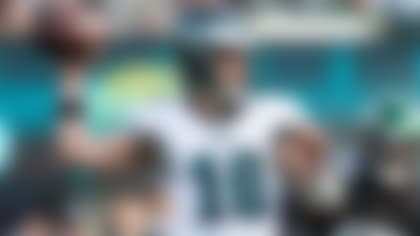Sammy Watkins is facing an uphill battle.
In baseball or basketball, a newly traded player can usually step into the action with his new team immediately. In football -- where terminology and philosophies can vary significantly from team to team, and where being in sync with your teammates is so crucially important -- it's not so easy to swap squads.
That said, I think it's easier for teams to pull off trades today than it was when I was with the Dallas Cowboys. Teams are putting a lot more resources into pro scouting than they did in my day, meaning pro scouting departments are much better, which leads to greater knowledge among potential trading partners. Combine that with the urgency to win, and trades are just more likely to happen than they once were.
Last week's moves -- Buffalo sent Watkins and a 2018 sixth-round pick to Los Angeles for cornerback E.J. Gaines and a 2018 second-rounder and also traded cornerback Ronald Darby to the Eagles for receiver Jordan Matthews and a 2018 third-rounder -- reminded me of a pair of trades I made in the 1970s. The first: In the 1972 preseason, Roger Staubach went down with an injury, leaving us with just one quarterback, Craig Morton. So we had to make a deal with the Bears to bring in Jack Concannon in August. The second: In 1975, coach Tom Landry walked into my office and declared that he wanted to trade John Niland away. I asked if he was sure -- Niland was a six-time Pro Bowler -- and Landry said he was, because we had Herb Scott to play behind him. With Scott likely to beat Niland out for a job that year anyway, Landry reasoned, why not try to get some value back for Niland first? So I shipped Niland to Philadelphia that September. Niland played one more year, while Scott played 10 more -- and the player we drafted with the pick we got back for Niland, Tony Hill, was another 10-year player who made a three Pro Bowls.
As for Bills' moves, I think they make sense for all teams involved, at least as it seems now.
The Rams needed to make a splash. If he stays healthy, Watkins can be a big-play machine and inject some serious excitement into Los Angeles' offense. The Eagles, who had a surplus at receiver, added a press-man cover corner in Darby who should thrive in coordinator Jim Schwartz's defense. The Bills got back a corner in Gaines who is probably a better fit for their defense than Darby and a receiver in Matthews who will work hard to make an impact. Importantly, Buffalo also added two picks for next year, further bolstering the team's war chest (the Bills now have six picks in the first three rounds) ahead of what is expected to be a strong quarterback draft.
Of course, it's too early to truly evaluate these moves. But it's not too early to take a look back at some prominent late-summer trades from the past few years. Below, I've reviewed and ranked five relatively recent preseason deals that worked out.
And if all this talk of trades has whet your appetite for speculation about potential future transactions, check out Marc Sessler's list of trade proposals that would make sense.
1) TE Greg Olsen to the Panthers, 2011
The deal: Bears trade Olsen to the Panthers on July 28 for a 2012 third-round pick.
This was a great deal for the Panthers. Olsen has been a rock for Cam Newton throughout his Carolina career -- he has nearly twice as many targets (680) as anyone else on the team since 2011, when Newton was drafted, and he's caught 22 percent of Newton's touchdown passes. He also became the only tight end in history to post three consecutive 1,000-yard seasons in 2016. And all it cost Carolina was a third-round pick. The hiring of offensive coordinator Mike Martz in 2010 ultimately led to Olsen's exit from Chicago, as the Bears apparently wanted more blocking at tight end, and Olsen was more of a pass catcher at the time. Of course, in the interim, Olsen has developed his blocking ability while maintaining his pass-catching prowess and reaching the Pro Bowl three times. Yes, Chicago used the pick acquired from the Panthers to then acquire Brandon Marshall -- who made first-team All-Pro once and the Pro Bowl twice in his three Chicago seasons -- in 2012. But considering Marshall's now on his third team since then while Olsen has been a consistent offensive force for Carolina, it's fair to argue the Bearsdid not get the full value out of the first-round pick they spent on Olsen in 2007.
2) QB Sam Bradford to the Vikings, 2016
The deal: Eagles trade Bradford to the Vikings on Sept. 3 for a 2017 first-round pick and 2018 conditional fourth-round pick.
Stepping in for the injured Teddy Bridgewater, Bradford saved the Vikings from utter disaster -- but if not for Carson Wentz's improbable ascendance in Philadelphia, this trade probably never would have happened. In 15 games with the Vikings, Bradford completed an NFL-record 71.6 percent of his passes, with 20 touchdowns against just five picks. The amazing thing is that he accomplished this despite joining the team just days before the season opener, which significantly compressed the amount of time he had to learn the offense and develop his timing with the pass catchers. The presence of Pat Shurmur -- his coordinator when he was Offensive Rookie of the Year in St. Louis -- on the Vikings' staff surely helped. Bradford sat out Week 1 but won his first four games under center, helping Minnesota get out to a hot start. Bradford might never live up to his pedigree as the first overall pick in 2010, but he's been plenty serviceable with the Vikings. The Eagles, meanwhile, used the 2017 pick (No. 14 overall) they acquired to draft promising defensive end Derek Barnett.
3) CB Vontae Davis to the Colts, 2012
The deal: Dolphins trade Davis to the Colts on Aug. 26 for a 2013 second-round pick and conditional sixth-round pick.
I know Davis well, and I think the best way to describe him is as a nonconformist. When he was drafted by Miami in the first round in 2009, he had the reputation of being a talented player who marched to the beat of his own drum. By August of 2012, he'd worn out his welcome with the Dolphins, and the Colts pounced. Sometimes, a change of scenery is what a guy needs -- and Davis has thrived in Indy under Chuck Pagano, earning two Pro Bowl nods and becoming a defensive cornerstone. As for the Dolphins' return on the deal, 2013 second-round pick Jamar Taylor was later traded to Cleveland for a seventh-round pick, while Miami never received the conditional sixth-round pick, because Davis did not play enough snaps in 2012 due to an injury.
4) OG Andy Levitre to the Falcons, 2015
The deal: Titans trade Levitre to the Falcons on Sept. 4 for a 2016 sixth-round pick and conditional 2017 late-round pick.
Just over two years after signing a big-money deal in Tennessee, Levitre was shipped to Atlanta. I thought at the time that this was a bad deal for the Falcons, because it looked like Levitre had lost the sizzle he'd shown in four standout seasons with the Bills (2009-2012). Since then, however, Levitre has looked much more like the player he was in Buffalo, proving to be a very valuable addition to the Falcons' line, which, of course, helped pave the way to their appearance in Super Bowl LI. In fact, in retrospect, it looks like Tennessee gave up on him too early.
5) OG Logan Mankins to the Buccaneers, 2014
The deal: Patriots trade Mankins to the Buccaneers on Aug. 26 for TE Tim Wright and a 2015 fourth-round pick.
Some people scratched their heads when New England jettisoned Mankins, who was coming off five straight Pro Bowl seasons. In retrospect, of course, the deal worked out for the Patriots, who saved on salary and extracted some value from Mankins while making room for younger talent -- like Marcus Cannon -- to eventually blossom on the offensive line. From that standpoint, this deal reminds me of the Niland trade. Plus, the fourth-round pick was used on Trey Flowers, who led New England with seven sacks last season. Mankins played well for Tampa, making the Pro Bowl in 2015, the final year of his career -- but the Bucs won just eight games during his two seasons there.
Follow Gil Brandt on Twitter _@GilBrandt_.












